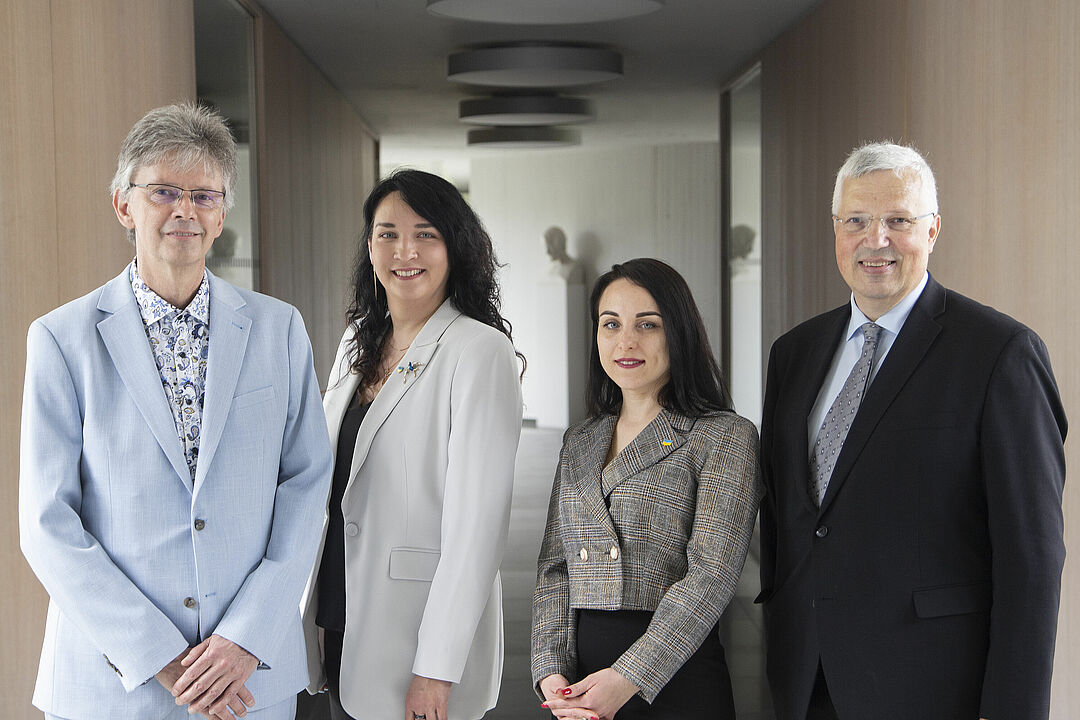Professor Dr Stefan Marschall, Vice President for International Relations and Science Communication, thanks the research group leaders for their commitment to supporting the Ukrainian researchers and makes reference to the efforts made by HHU to aid scientists at risk: “In the spirit of our namesake, Heinrich Heine, our University stands for the freedom of science and the strengthening of international cooperation. And in this spirit we support our researchers who are establishing collaborations with countries where their colleagues are at risk – with Ukraine our particular focus at the moment.”
Dr Irina Konovalova will work with Dr Guido J. Reiß at the Chair of Bioinorganic Chemistry. Having studied chemistry, she gained her doctorate at V. N. Karazin Kharkiv National University. She works at the State Scientific Institution “Institute for Single Crystals” of the National Academy of Sciences of Ukraine as a Senior Researcher in the Department of X-ray Diffraction Studies and Quantum Chemistry.
Dr Konovalova’s field of research covers the investigation of the molecular and crystal structures of aromatic compounds. These compounds serve as important structural elements in many bioactive products and products that can be used in medicine, and are generally key components of organic functional materials. Combining experimental crystal structure analysis with quantum chemical calculations enables the study of the energy ratios of crystalline materials. The methodology enables the role of various intermolecular interactions to be evaluated and the supramolecular architecture of crystalline materials to be predicted. These investigations also allow conclusions to be drawn about the material properties of this technologically interesting substance class.
This ultimately also makes it possible to create targeted solid-state structures using so-called crystal engineering, which is an important tool for e.g. pharmaceutical research.
Dr Reiß on the goals of the joint project at HHU: “Through her expertise in quantum chemical calculations and analysis of organic, crystalline solid-state bodies, Dr Konovalova will significantly expand the methodology knowledge available in the research group. The supramolecular architecture of halogen- and amino-substituted aromatic compounds in particular is a perfect fit with our research interests and we are aiming to make the collaboration with Dr Konovalova’s home institute permanent.”
Professor Dr Maryna Kornet is integrated in the research group headed by Professor Dr Thomas J. J. Müller at the Chair of Organic Chemistry. She studied chemistry at Zaporizhzhia National University and gained her doctorate in bioorganic chemistry at the National Academy of Sciences of Ukraine in Kiev. Kornet is an associate professor at the Department of Chemistry at the university in Zaporizhzhia and head of the Laboratory of Biotechnology of Physiologically Active Substances there.
Professor Kornet is investigating biologically active derivatives of nitrogene heterocyclic compounds, in particular compounds bearing sulphur-containing groups found in cellular metabolism. She is concerned with how the structure of these substances influences their activity, with the synthesis of the substances, their physical and chemical properties and their biological activity. Of primary interest are compounds with antioxidative, radioprotective and antimicrobial properties and concomitant low toxicity for humans.
Professor Kornet is aiming to develop new radioprotective agents on the basis of S-functionalised cysteamines in her EU-funded project in Düsseldorf over the next two years. In the process, the intention is to clarify the mode of action of these substances, which is still not fully clear, and decode the structure-bioactivity relationship of radioprotective agents. This work also aims to help strengthen interdisciplinary cooperation between research groups from the chemistry and biology areas. A further aspect is the introduction of German educational approaches at the university in Zaporizhzhia.
Professor Müller: “The expertise of our Düsseldorf research group will complement the biological-analytical focus of Professor Kornet to fruitful effect. We are also aiming to intensify scientific collaboration between Germany and Ukraine, and support early career researchers.”
Support for at-risk and refugee scientists
At HHU, the measures to support at-risk and refugee scientists are coordinated by JUNO, the “Junior Scientist and International Researcher Center”. Dr Sigrun Wegener-Feldbrügge provides advice on various programmes offered by the German Academic Exchange Service (DAAD), Alexander von Humboldt Foundation, German Research Foundation (DFG) and Leopoldina German National Academy of Sciences. In addition, she supports at-risk and refugee scientists and their host institutes in preparing applications. HHU also participates in a qualification programme especially for at-risk and refugee researchers within the framework of the NRW Group of “Scholars at Risk”.
The advice and support services offered by the JUNO Welcome Center help at-risk and refugee researchers and their families settle in quickly after arriving in Düsseldorf and become integrated at HHU.
More information: HHU website for support for at-risk and refugee scientists
MSCA4Ukraine funding programme
The programme for researchers from Ukraine is funded under the EU’s “Marie Skłodowska Curie Actions” (MSCA). It is aimed at giving Ukrainian researchers, who can no longer work at their home institutes, the opportunity to continue their research at an institute in an EU member state or associated country. On the one hand, this ensures research continuity and on the other hand helps strengthen research institutes in Ukraine.
A total of 124 projects across Europe received support in the 2022 round of funding. HHU originally had three successful applications, but one applicant has since moved to another location. Two of the three chemistry projects applied for in Germany are thus being realised at HHU.
More information: MSCA4Ukraine website


